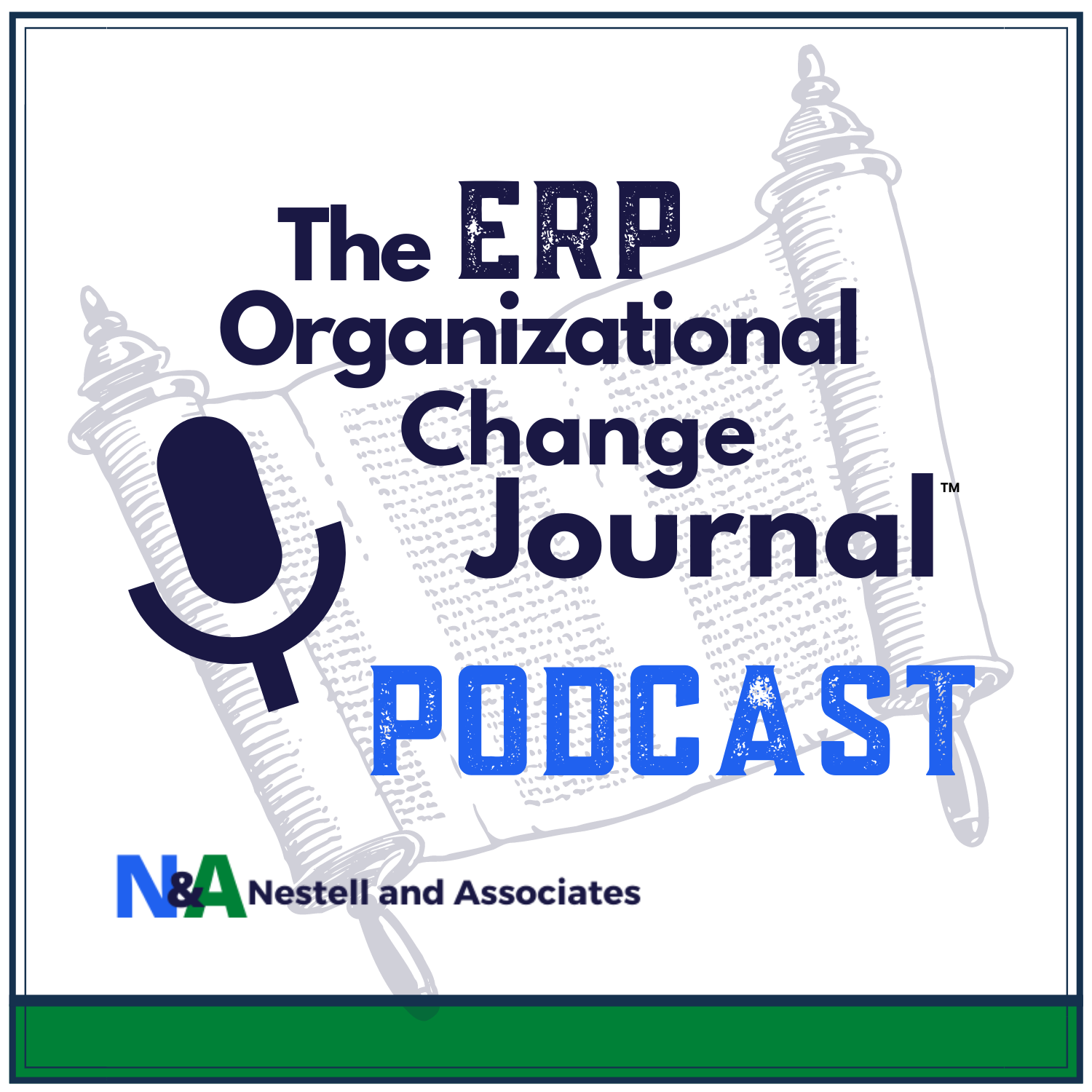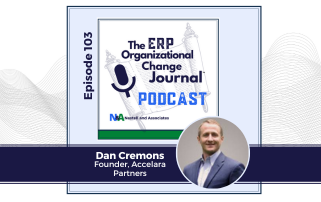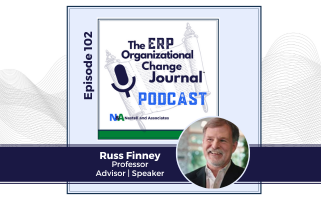About this Episode
In this episode, we will explore ERP organizational learning strategy. Join us we dive into a fundamental and key notion to ERP organizational change success, organizational learning. Our guest will share some insight into the basic learning principles, learning behaviors, and tactical actions to support organizational learning.
For large-scale ERP organizational change, organizational leadership can take advantage of learning from others whether in practice or research. One thing that we do know from research is that team learning behaviors may have had a significant and consistent positive effect on team performance and hence ERP success.
Research also suggests that intentionally creating cultures of inquiry in which organizational stakeholders engage in learning with the intent of improving their processes and practices is a signification benefit. Furthermore, some research suggests that in a positive culture of inquiry and learning, employees should be left to feel that communication does not equate to criticism. To promote a culture of inquiry, an deliberate ERP organizational learning strategy is crucial. It is important to understand how stakeholders perceives, values, and promotes questioning and learning. In this episode, we learn more about this topic with Julie. Effective ERP organizational learning strategy is a critical component of your success!
More About Julie
Julie Dirksen is the author of the book Design For How People Learn and an independent consultant and instructional designer who has more than 20 years’ experience creating highly interactive e-Learning experiences for clients ranging from Fortune 500 companies to innovative technology startups to major grant-funded research initiatives.
Her focus has been on utilizing the disciplines of educational psychology, instructional design, and behavioral science to promote and support the improvement of peoples’ lives through sustainable long-term learning and behavioral change. She holds an M.S. degree in Instructional Systems Technology from Indiana University and has also been an adjunct faculty member at the Minneapolis College of Art and Design.
Connect with Julie
Website https://usablelearning.com/
Facebook Group – Design for How People Learn https://www.facebook.com/groups/designforhowpeoplelearn
Nerdy Shop Talk with Julie Dirksen and Tracy Parish http://nerdyshoptalk.com/
Design Better Learning – Online Courses https://designbetterlearning.com/
Mentions
- Dirksen, J. (2015). Design for how people learn. New Riders.
- Seligman, M. E. (1972). Learned helplessness. Annual review of medicine, 23(1), 407-412.
- Duhigg, C. (2012). The power of habit: Why we do what we do in life and business (Vol. 34, No. 10). Random House.
- Duhigg, C. (2016). Smarter faster better: the transformative power of real productivity. Random House.
- Brinkerhoff, R. O. (2005). The success case method: A strategic evaluation approach to increasing the value and effect of training. Advances in Developing Human Resources, 7(1), 86-101.
- Snowden, D. (2010). The cynefin framework. YouTube video, 8, 38.
- Dr. Antonio Damasio, https://en.wikipedia.org/wiki/Antonio_Damasio
- E-Learning Heroes, https://community.articulate.com/
- Kim, A. J. (2006). Community building on the web: Secret strategies for successful online communities. Peachpit press.
Episode Highlights
11:28 There is “learning” and then there is effective and efficient learning. For this reason, organizations benefit by reflecting on learning needs, determining learning goals, evaluating resources, evaluating progress, and modifying learning approaches if needed. would you agree with this statement? Please elaborate.
13:23 As a follow-up then, can you describe for our listeners “INSTRUCTIONAL GAP ANALYSIS” as a “systematic framework for breaking down a learning challenge and selecting appropriate and effective learning strategies.”?
In fact, regarding Chapter 1: Where Do We Start? , you share that “ If learning is a journey, what’s the gap between where they are and where they need to be? Sometimes that gap is knowledge, but just as often the gap can be skills, motivation, habit, or environment.”
23:22 In your book and in your work you talk about this idea of “DESIGN FOR BEHAVIOR CHANGE”. What do you mean by “Learn to use research-based diagnostic tools to analyze and select interventions for difficult behavior change challenges”.?
26:32 In your work you discuss the idea of designing training for complex skills and you state that “using frameworks from complexity science and the science of expertise development to diagnose complex learning problems and design experiences that support complex skill development.” Is an important part of the process. In fact, you have workshops to discuss this. What is this and why is it important?
35:10 What can you share with our listeners in terms of “The Science of Attention and Engagement for Learning”. Can you just share maybe some principles that you apply in your work? I guess this question is falling into the “Motivation Science” category as well.
44:40 About “Design for Social and Informal Learning”? How does that work and what does that look like?
52:47 Lastly Julie, If you were going to give advice to an organization regarding successful learning what little golden nugget would you like to leave with our listeners?
Related Episodes from TheERPocj & Blog Posts
- Episode 61 – Creating Successful ERP Results Through Instructional & Organizational Learning Design Processes with guest Dr. Lisa Giacumo
- Episode 48 – ERP Organizational Learning with guest Mike Taylor
- Episode 44 – An ERP Critical Success Factor: Organizational Learning with guest Dr. Clark Quinn
- Episode 37 – Learning and Development and Human Performance Technology and its Return on Investment with guest Dr. Tim Brock
- Episode 22 – Effective Principle Based Learning with guest Alex Salas
- Episode 19 – Training Evaluation with guest Dr. Jim Kirkpatrick
- Episode 2 – Organizational Performance Improvement with guest Dr. Richard E. Clark
Latest Episodes
Human Capital in PE-Backed Companies: Strategies for Leadership and Talent Management
Human Capital in PE-Backed Companies: Strategies for Leadership and Talent ManagementEpisode Overview - PE-backed Human Capital Strategies Today’s episode centers on the pivotal role of human capital in PE-backed companies, emphasizing how strategic leadership and...
ERP Organizational Change: Technology Strategy
ERP Organizational Change: Technology Strategy and Keys to SuccessEpisode Overview - Technology Strategy In general, at the highest level of categorization, there seems to be consensus on the importance of people and culture, informational technology, and project...
AI and Private Equity Synergy: Fueling Business Transformation
AI and Private Equity Synergy: Fueling Business TransformationEpisode Overview - AI in PE Strategies In this episode, we explore how AI and Private Equity synergies are fueling business transformations and reshaping investment strategies and operational efficiencies....






0 Comments